| The Smiths (Rough Trade, Feb. 1984) |
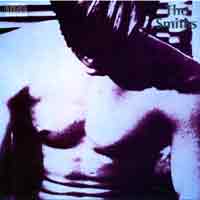 Das
Debutalbum der Band um den Sänger/Texter Morrissey
und den Gitarristen/Komponisten Johnny Marr. Als es damals erschien,
reagierte – schon im Vorfeld – die englische Presse wieder
einmal völlig hysterisch und jubelte die Band in die Charts. Ausnahmsweise
mal zu Recht. Die Smiths haben Britanniens Musikwelt nachhaltig beeinflusst.
Vor den Smiths war Morrissey schon als Bucherschreiber aktiv („James
Dean Isn’t Dead“) und leitete die UK-Filiale des New York
Dolls Fan Clubs. Das
Debutalbum der Band um den Sänger/Texter Morrissey
und den Gitarristen/Komponisten Johnny Marr. Als es damals erschien,
reagierte – schon im Vorfeld – die englische Presse wieder
einmal völlig hysterisch und jubelte die Band in die Charts. Ausnahmsweise
mal zu Recht. Die Smiths haben Britanniens Musikwelt nachhaltig beeinflusst.
Vor den Smiths war Morrissey schon als Bucherschreiber aktiv („James
Dean Isn’t Dead“) und leitete die UK-Filiale des New York
Dolls Fan Clubs.
Ich habe aber zugegebenermaßen bis zum dritten Album "Meat
Is Nurder" gebraucht, um diese Band fur mich zu entdecken!
Bei einigen Titeln ist übrigenz mein alter Bekannter Paul Carrack
(Ace, Squeeze,
Nick Lowe, Roxy Music, Mike & The Mechanics,
etc.) an den Keyboards dabei. |
| Joe Jackson: "Body & Soul" (A&M, März 1984) |
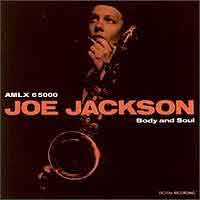 Ich
bin zwar kein richtiger Fan des britischen Genies und Misanthropen,
aber ich finde, dass dies ein wunderbares Album ist - nicht zuletzt
wegen des coolen, an eine alte Blue Note-Platte von Sonny
Rollins angelehnten Covers. Ich
bin zwar kein richtiger Fan des britischen Genies und Misanthropen,
aber ich finde, dass dies ein wunderbares Album ist - nicht zuletzt
wegen des coolen, an eine alte Blue Note-Platte von Sonny
Rollins angelehnten Covers. |
| Laura Nyro: "Mother's Spirtual" (Columbia, März 1984) |
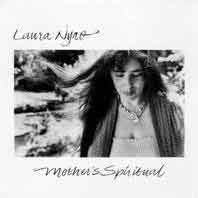 Nach
sechs Jahren Pause mal wieder ein Album der Sängerin, Pianistin
und Songschreiberin, die ihre größten Erfolge bereits als
Teenager Ende der 60er feierte, als teilweise mehrere ihrer Songs gleichzeitig
in den US-Charts waren - leider aber immer in den Versionen anderer
Kunstler (z.B. "Wedding Bell Blues" von den 5th Dimensions,
"Eli's Coming" von Three Dog Night, "Stoney End"
von Barbara Streisand, "And When I Die" von Blood,
Sweat & Tears), dabei waren alle ihre eigenen Alben, so auch
dieses von Todd Rundgren produzierte, immer von beeindruckender Qualität.
Kleines Kuriosum am Rande: ihren einzigen eigenen Hit hatte sie mit
einer Coverversion: "Up On The Roof" von Carole King. Nach
sechs Jahren Pause mal wieder ein Album der Sängerin, Pianistin
und Songschreiberin, die ihre größten Erfolge bereits als
Teenager Ende der 60er feierte, als teilweise mehrere ihrer Songs gleichzeitig
in den US-Charts waren - leider aber immer in den Versionen anderer
Kunstler (z.B. "Wedding Bell Blues" von den 5th Dimensions,
"Eli's Coming" von Three Dog Night, "Stoney End"
von Barbara Streisand, "And When I Die" von Blood,
Sweat & Tears), dabei waren alle ihre eigenen Alben, so auch
dieses von Todd Rundgren produzierte, immer von beeindruckender Qualität.
Kleines Kuriosum am Rande: ihren einzigen eigenen Hit hatte sie mit
einer Coverversion: "Up On The Roof" von Carole King. |
| Scott Walker: "Climate Of Hunter" (Virgin, März 1984) |
|
 Eine sehr merkwurdige Platte - aber irgendwie spurt man
die Größe, die darin steckt. Kennt Ihr das auch: Ihr glaubt
ein Meisterwerk zu hören - und wisst gleichzeitig, dass Ihr als
Hörer dafur eigentlich noch nicht reif seid. Nun ja ...
Eine sehr merkwurdige Platte - aber irgendwie spurt man
die Größe, die darin steckt. Kennt Ihr das auch: Ihr glaubt
ein Meisterwerk zu hören - und wisst gleichzeitig, dass Ihr als
Hörer dafur eigentlich noch nicht reif seid. Nun ja ...
Die Band, die diese schweren Klänge produziert, kommt im wesentlichen
aus dem Van Morrison-Umfeld (Drummer Pete van Hooke, Trompeter/Keyboarder
Mark Isham, die Gitarristen Ray Russell und Phil
Palmer). Nur Mark Knopfler und Billy Ocean scheinen
sich hier irgendwie hin verirrt zu haben.
(2004)
Das ist schon irgendwie merkwurdig: vor etwa zwei Jahren habe
ich bei meiner Auswahl der Inselplatten "Climate Of The Hunter"
zu meiner Lieblinxplatte des Jahres 1984 erklärt. Jetzt ist gerade
im 11-Jahre-Abstand "The Drift", der Nachfolger zum 1995-Werk
"Tilt", erschienen und
Virgin hat "Climate Of The Hunter", angeblich die schlechtverkaufteste
Platte der Firma endlich auf CD veröffentlicht, wobei ich naturlich
zugegriffen habe, obwohl diese Veröffentlichungspolitik naturlich
ziemlich opportunistisch ist. Während "Tilt"
und "The Drift" ja völlig abgehoben sind und sich der
Bewertung entziehen, finde ich "Climate Of The Hunter" nun
doch nicht mehr ganz so toll. Zumindest habe ich meine Wahl zum Album
des Jahres uberdacht und mich inzwischen naturlich auf die
Go-Betweens festgelegt!
(01.06.2006)

 Mehr ...
Mehr ...
Walker's only album of the 1980s was both a blow for artistic credibility, and a blow against most of his old fans. The voice of the balladeer was still intact, and still even crooned sometimes. But the arrangements backed brow-furrowing, obtuse lyrics with '80s-oriented rock that incorporated some quasi-classical structures. Walker was seemingly more interested in painting abstracts in which the textures counted more than the content. This made for an album which may have been a hell of a lot more interesting than '80s efforts by other '60s pop stars, but at the same time it was rather impenetrable, and one's attention tended to drift off over the course of the set. Yet it was not half as radical as the avant-garde direction he would stake out with his next album ten years later, Tilt.
(by Richie Unterberger, All Music Guide)
'Climate of Hunter' was Scott Walker's sole-release in the 1980s, continuing the directions suggested by Scott's contributions to the final Walker Brothers LP 'Nite Flights' (1978). 'Nite Flights' saw Walker compose again for the first time since flop 'Til the Band Comes In' - the interim seeing inept cover versions ('Many Rivers to Cross' anyone???), flop solo albums, and the reformation of the Walker Brothers - who went from truimphic return with 'No Regrets' to off the register with follow-ups 'Lines' and 'Nite Flights'. Walker's writer's block ended with the four songs on 'Nite Flights', whichmore� were probably closer to Bowie than Walker of old ; the terrifying composition 'The Electrician' spelt out the future, Walker making avant-pop with sinister themes (the torture apparent in that song is continued to 'Dealer' here, and features on 1995's masterpiece 'Tilt'). A listen to 'Nite Flights' or 'The Electrician' is the ideal preperation for 'Climate of Hunter' - which is an overlooked album that might even make 'Tilt' make sense to those otherwise confounded. After reportedly turning down offers to work with Bowie, Eno and David Sylvian (there is a rumour that Walker began to record with Eno, but halted proceedings over Daniel Lanois' hair!!!!) Walker recorded his sole album for Virgin. As 'Tilt' it is produced by Peter Walsh (previously known for Simple Minds' pop-classic 'New Gold Dream, 81, 82, 83, 84') and features a collaboration with Brian Gascoigne who would contribute heavily towards 'Tilt.''Climate of Hunter' itself fitted right in with a lot of great music in the 1980s, its sound not far from the Blue Nile, Roxy Music's 'Avalon', Peter Gabriel's '4',Magazine's 'The Correct Use of Soap' & David Sylvian (both Mark Isham and Phil Palmer would work with the latter). Opener 'Rawhide' finds Walker in oblique mode, the song bursting into life with the suitably odd, "Cro-magnon herders will stand in the wind..." which makes as much sense as "The insomniac gnaws in the On-Offs..." - lyrically comparisons to the meticulous nonsense practiced by late period Joyce work (though the feeling of Walker's work here and subsequently seems closer to Samuel Beckett). 'Dealer' is gorgeous, creepy stuff which was once memorably described as "like David Sylvian after being hit by lightning", with lyrics that appear to be related to 'The Electrician': "The windows are ringing...move a circuit on the white and he can't feel a thing..."Four of the tracks here show that Walker wasn't in the mood for playing the game, plumping for titles such as 'Track Three', 'Track Five', 'Track Six' & 'Track Seven' - Three, Five, and Seven even resemble each other. Walker appears to have come to the end of any pop-formula - 'Track Three (Delayed)' is a catchy chant with a harmony vocal from Billy Ocean (????), while 'Track Five (It's a Starving)' opens with an ambient-guitar piece before the band come in. 'Track Seven (Stump of a Drowner)' like 'Five' opens with a guitar-sequence worthy of 'Gone to Earth' before a similar rhythm comes in - the feeling of these tracks are that Walker is essentially rewriting and exhausting the style of the song 'Nite Flights.''Climate of Hunter' is varied in part - 'Sleepwalkers Woman' would fit on one of the Scott-albums with Walker accompanied by strings (...though his voice is beginning to change to a more operatic style apparent on 'Tilt')in territory not that far from solo-classic 'Boy Child.' 'Track Six (Say It)' is much odder, avant fretless bass from John Giblin (Kate Bush, Simple Minds)set to a gothic metronome before the sounds of horses braying and sinister 'Psycho'-strings are employed - the kind of thing Bowie tried on '1.Outside' and that Radiohead faked a lot on 'Kid A/Amnesiac' (it can also be argued that the atmosphere of 'Climate of Hunter' found its way onto U2's 'The Joshua Tree' on such tracks as 'With or Without You' & 'Mothers of the Disappeared'). The most surprising track is the closing cover of Tennessee Williams' 'Blanket Roll Blues' - which was originally sung by Marlon Brando in 'The Fugitive Kind.' This finds Walker accompanied by Dire Straits' Mark Knopfler on his trademark guitar that strikes horror into people like me who thought 'Love Over Gold' & 'Brothers in Arms' were the work of Satan. Instead it's a gorgeously minimal piece that reminds me of David Sylvian's acoustic collaborations with Bill Frissell & the late Derek Bailey. The album concludes with Walker's wonderful delivery of Williams' lyrics, "When I crossed the river/with a heavy blanket roll/I took nobody with me/Not a soul/I took a few provisions/Some for comfort, some for cold/But I took nobody with me/Not a soul." Great stuff...and even better now it's been remastered. The time is right to rediscover this lost classic from the decade many wrote off - though the better news is that Scott's new album 'The Drift' is to be released by 4AD later this year. Ah, the Godlike Genius of Scott Walker...
|
| Echo & The Bunnymen: "Ocean Rain" (WEA/Korova, Apr. 1984) |
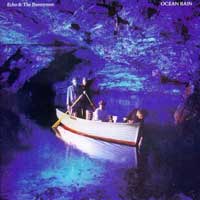

 Mehr ...
Mehr ...
Channeling the lessons of the experimental Porcupine into more conventional and simple structural parameters, Ocean Rain emerges as Echo & the Bunnymen's most beautiful and memorable effort. Ornamenting Ian McCulloch's most consistently strong collection of songs to date with subdued guitar textures, sweeping string arrangements, and hauntingly evocative production, the album is dramatic and majestic; "The Killing Moon," Ocean Rain's emotional centerpiece, remains the group's unrivalled pinnacle.
(by Jason Ankeny, All Music Guide)
|
| The Gun Club: "The Las Vegas Story" (Chrysalis/Animal, April 1984) |
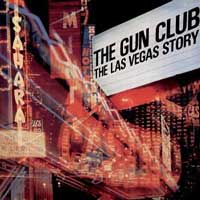 Letztes
Album der Band um den wilden Mann Jeffrey Lee Pierce vor deren
Auflösung. Im nächsten Jahr folgt dann das sehr schöne
Soloalbum "Wildweed",
das naturlich trotzdem wie eine richtige Gun Club-Platte
klingt. Mit dem 1987er Album "Mother
Juno" besinnt sich der Mann wieder und nennt das ganze wieder
korrekt. Letztes
Album der Band um den wilden Mann Jeffrey Lee Pierce vor deren
Auflösung. Im nächsten Jahr folgt dann das sehr schöne
Soloalbum "Wildweed",
das naturlich trotzdem wie eine richtige Gun Club-Platte
klingt. Mit dem 1987er Album "Mother
Juno" besinnt sich der Mann wieder und nennt das ganze wieder
korrekt. |
| The Moodists: "Thirsty's Calling" (Virgin/Red Flame, April 1984) |
 Nick
Cave mit seiner Birthday Party und die Go-Betweens
waren nicht die einzigen Australier, die sich damals in London herumgetrieben
haben. Sänger Dave Graney und Trommlerin und Ehefrau (oder
Freundin?) Clare Moore spielten mit ihren Mitstreitern einen
Nick Cave nicht ganz unähnlichen punkigen Bluesrock, auch
wenn Graney den Vergleich wohl nicht so gerne hörte. Ende der 80er
gingen Graney und Moore zuruck nach Australien und machten zuerst
mit den White Buffalos und den Coral
Snakes sowas wie Countryrock (sie coverten auf "My
Life On The Plains" ganz wunderbar Gram Parsons und
Gene Clark) und haben im neuen Jahrtausend als The Dave Grane
Show auch den Computer entdeckt, was mir persönlich dann nicht
mehr ganz so gut gefällt. Was bleibt unterm Strich: ein begnadeter
Sänger, der sich durchaus mit Van Morrison messen kann,
in seiner wilden Fruhphase. Nick
Cave mit seiner Birthday Party und die Go-Betweens
waren nicht die einzigen Australier, die sich damals in London herumgetrieben
haben. Sänger Dave Graney und Trommlerin und Ehefrau (oder
Freundin?) Clare Moore spielten mit ihren Mitstreitern einen
Nick Cave nicht ganz unähnlichen punkigen Bluesrock, auch
wenn Graney den Vergleich wohl nicht so gerne hörte. Ende der 80er
gingen Graney und Moore zuruck nach Australien und machten zuerst
mit den White Buffalos und den Coral
Snakes sowas wie Countryrock (sie coverten auf "My
Life On The Plains" ganz wunderbar Gram Parsons und
Gene Clark) und haben im neuen Jahrtausend als The Dave Grane
Show auch den Computer entdeckt, was mir persönlich dann nicht
mehr ganz so gut gefällt. Was bleibt unterm Strich: ein begnadeter
Sänger, der sich durchaus mit Van Morrison messen kann,
in seiner wilden Fruhphase. |
| David Sylvian: "Brilliant Trees" (Virgin, April 1984) |
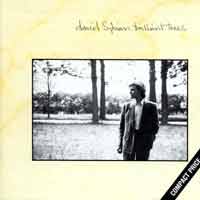 Das
Solodebut des ehemaligen Japan-Sängers, begleitet von seinem
Bruder Steve Jansen am Schlagzeug und Can-Bassist Holger Czukay
und unterstutzt von zahlreichen Gästen (u.a. Basslegende
Danny Thompson, dem japanischen Klangzauberer Ryuichi Sakamoto
und gleich drei außergewöhnlichen Jazztrompetern: Kenny Wheeler,
Jon Hassell und Mark Isham!) ist klanglich und musikalisch
ein Meisterwerk. Eine meiner ersten und liebsten CDs. Das
Solodebut des ehemaligen Japan-Sängers, begleitet von seinem
Bruder Steve Jansen am Schlagzeug und Can-Bassist Holger Czukay
und unterstutzt von zahlreichen Gästen (u.a. Basslegende
Danny Thompson, dem japanischen Klangzauberer Ryuichi Sakamoto
und gleich drei außergewöhnlichen Jazztrompetern: Kenny Wheeler,
Jon Hassell und Mark Isham!) ist klanglich und musikalisch
ein Meisterwerk. Eine meiner ersten und liebsten CDs. |
| Nick Lowe: "Nick Lowe And His Cowboy Outfit" (F-Beat, Mai 1984) |
|
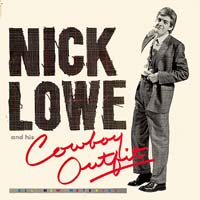 Ganz klar: Nick Lowe, Ex-Sänger und Bassist bei Pubrock-Legende
Brinsley Schwarz und danach mit
Dave Edmunds bei Rockpile, ist
einer meiner Lieblingssongschreiber aus England. Und auch seine Soloalben
liefern immer angenehm zu hörenden, irgendwie altmodischen und
doch frischen Pop. Sicherlich ist er in den 80ern nicht mehr so hip
wie in den 70ern, als er half, das Kultlabel Stiff mit auf
die Beine zu stellen. Hier wird jetzt einfach nur zeitlos geschuffelt.
Mit dabei sind als feste Band: Paul Carrack (Ex-Ace)
an den Tasten, Martin Belmont (Ex-Ducks
Deluxe) an der Gitarre und Bobby Irwin am Schlagzeug. Dieses
Viererbande könnte man auch die Pubrock-Allstars nennen - wenn
dieser Begriff nicht so dämlich klingen wurde!
Ganz klar: Nick Lowe, Ex-Sänger und Bassist bei Pubrock-Legende
Brinsley Schwarz und danach mit
Dave Edmunds bei Rockpile, ist
einer meiner Lieblingssongschreiber aus England. Und auch seine Soloalben
liefern immer angenehm zu hörenden, irgendwie altmodischen und
doch frischen Pop. Sicherlich ist er in den 80ern nicht mehr so hip
wie in den 70ern, als er half, das Kultlabel Stiff mit auf
die Beine zu stellen. Hier wird jetzt einfach nur zeitlos geschuffelt.
Mit dabei sind als feste Band: Paul Carrack (Ex-Ace)
an den Tasten, Martin Belmont (Ex-Ducks
Deluxe) an der Gitarre und Bobby Irwin am Schlagzeug. Dieses
Viererbande könnte man auch die Pubrock-Allstars nennen - wenn
dieser Begriff nicht so dämlich klingen wurde!

 Mehr ...
Mehr ...
|
"While it may not be full of familiar tunes, there's enough here
to keep you interested until the record's stopped spinning. Ever the consummate
tunesmith, Nick has a way with a melody, a bit of harmony and a chugging
rhythm or two. I'm not sure if his involvement in the Carter/Cash collective
spawned his cowboy persona, but the music isn't a rooted in country as
the cover would have us believe. And as always his band can go the distance
as necessary and then some. The cover photos show us Nick in his "Sunday
go to meetin'" and his "Saturday night special" outfits.
Such a classy lad he is." (TralFaz-Archives)
|
|
| The Dream Syndicate: "Medicine Show" (A&M, Juni 1984) |
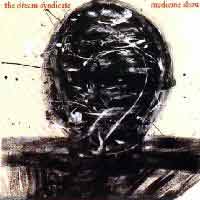 Das
erste Album der Band bei einer großen Firma - und trotzdem (?) klasse.
Das war damals auch der (Wieder-)Einstieg fur mich nach einer langen
und wichtigen Bluesphase in die Welt des Gitarrenrocks.
Danke, Steve Wynn. Das
erste Album der Band bei einer großen Firma - und trotzdem (?) klasse.
Das war damals auch der (Wieder-)Einstieg fur mich nach einer langen
und wichtigen Bluesphase in die Welt des Gitarrenrocks.
Danke, Steve Wynn.

 Mehr ...
Mehr ...
In 1982, the Dream Syndicate seemed to come out of nowhere (actually Davis, CA, but close enough) to become the most talked about band in underground rock with their debut album The Days of Wine and Roses, recorded for the tiny but prestigious Ruby Records label when the group was all of nine months old. After waves of positive press, A&M Records signed the Dream Syndicate and they went into the studio with producer Sandy Pearlman, who spent five months in the studio guiding the band through their second LP. Given their sudden rise to success, the Dream Syndicate probably would have dealt with a certain amount of critical backlash no matter how their sophomore effort turned out, but Medicine Show was greeted with openly hostile reviews, largely because it sounded practically nothing like the album that sent tongues wagging two years earlier. Where The Days of Wine and Roses was a raw but passionate fusion of Highway 61-era Bob Dylan and the Velvet Underground at their most primal, Medicine Show sounded big and polished, but also dusty and weathered, with the terse, nose-thumbing lyrics of the debut replaced with dark, complex narratives full of bad luck and bad blood backed with booming drums and roaring guitars that were significantly more rockist than what Steve Wynn and Karl Precoda brought to their earlier recordings. Viewed in the context of Wynn's career, Medicine Show marks the spot where the lyrical themes and musical approach of his later work would first come into focus, but it still doesn't bear much resemblance to what the Dream Syndicate would create on their subsequent albums in its grand, doomy tone and obsessive but curiously unobtrusive production style. Medicine Show isn't a grand failure as its initial detractors claimed, but it isn't the triumph some revisionist fans imagine it to be, either; there are a few great songs scattered throughout (especially "Merrittville" and "Armed with an Empty Gun"), and once it works its way in, the 8:48 of "John Coltrane Stereo Blues" is as potent a guitar workout as anything this band would ever release. But in most respects, this finds Wynn and his bandmates reaching for something they couldn't quite grasp, and Tom Zvoncheck's keyboards, for all their drama, never really find their way into the music. Lots of bands let loose with a major-label budget for the first time have made lavish records that didn't quite work, but unlike most of them, Medicine Show doesn't sound like a grandiose waste of money. Instead, it's a widescreen guitar spectacle with the soul of a Jim Thompson paperback, and if it doesn't always work, enough of it does to make it worthy of serious reappraisal.
(by Mark Deming, All Music Guide)
|
| Everything But The Girl: "Eden" (WEA/Blanco Y Negro, Juni 1984) |
 Debutalbum
und direkter Chartserfolg eines meiner Lieblingsduos aus England (naturlich
nicht die blöden Eurythmics!). Sängerin Tracey Thorn
hat eine wunderbare Stimme (die mir zum ersten Mal auf den Alben "Liberty
Belle..." der Go-Betweens und "Mainstream"
von Lloyd Cole aufgefallen war. Ihr Partner ist der Gitarrist
und Gelegenheitskeyboarder und -sänger Ben Watt. Beide schreiben
getrennt und auch gelegentlich zusammen ziemlich gute Songs. Unterstützt
werden sie bei der Umsetzung von einer vorzüglichen Band: Simon
Booth (Gitarre, von Working Week), Bosco De Oliveira
(Perkussion), Charles Hayward (Schlagzeug), Chucho Merchan
(Kontrabass), Pete King (Altsax), Nigel Nash (Tenorsax)
und Dick Pearce (Trompete). Debutalbum
und direkter Chartserfolg eines meiner Lieblingsduos aus England (naturlich
nicht die blöden Eurythmics!). Sängerin Tracey Thorn
hat eine wunderbare Stimme (die mir zum ersten Mal auf den Alben "Liberty
Belle..." der Go-Betweens und "Mainstream"
von Lloyd Cole aufgefallen war. Ihr Partner ist der Gitarrist
und Gelegenheitskeyboarder und -sänger Ben Watt. Beide schreiben
getrennt und auch gelegentlich zusammen ziemlich gute Songs. Unterstützt
werden sie bei der Umsetzung von einer vorzüglichen Band: Simon
Booth (Gitarre, von Working Week), Bosco De Oliveira
(Perkussion), Charles Hayward (Schlagzeug), Chucho Merchan
(Kontrabass), Pete King (Altsax), Nigel Nash (Tenorsax)
und Dick Pearce (Trompete).
Der Sound? Irgendwo zwischen Folk, Pop und Jazz, sehr laidback, aber
immer tauglich für ein breites Publikum. |
| Prince & The Revolution: "Purple Rain" (Warner, Juli 1984) |
 Sein
Meisterwerk darf natürlich in dieser Liste nicht fehlen! Sein
Meisterwerk darf natürlich in dieser Liste nicht fehlen! |
| Bobby & The Midnites: "Where The Beat Meets The Street" (Columbia, Okt. 1981) |


 Mehr ...
Mehr ...
Where The Beat Meets The Street, The Midnites' second and final album, saw the group going for mid-'80s radio acceptance with a vengeance. As he had in his '70s group, Kingfish, Bob Weir began to take a backseat in his own band, leaving most of the singing up to Bobby Cochran and bringing in a host of outside songwriters. What you got was, as one song put it, "Rock In The '80s," a set of frisky toe-tappers that concerned themselves mostly with the magical world of rock & roll. What can Deadheads have made of this? Actually, probably only a few of them (or anyone else) got to hear this album, which sank without a trace after four weeks at the bottom of the charts, followed by the demise of the group itself.
(by William Ruhlmann, All Music Guide)
|
| Robyn Hitchcock: "I Often Dream Of Trains" (Midnight Music, Sept. 1984) |
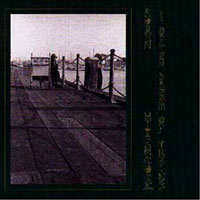 Das legendäre Solo-Akustikalbum des ehemaligen Chefs der Soft
Boys und zukünftigen Chefs der Egyptians.
Dazu passt dann noch die DVD zum 25jährigen Veröffentlichungsjubiläum,
auf der Hitchcock das komplette Album
live auf die Bühne bringt.
Das legendäre Solo-Akustikalbum des ehemaligen Chefs der Soft
Boys und zukünftigen Chefs der Egyptians.
Dazu passt dann noch die DVD zum 25jährigen Veröffentlichungsjubiläum,
auf der Hitchcock das komplette Album
live auf die Bühne bringt.
(2009)

 Mehr ...
Mehr ...
Hitchcock was so shaken by the entire Groovy Decay disaster that he retired from recording for two years. When he returned in 1984 with I Often Dream of Trains, it was clear that the time off had affected his music. A collection of spare, acoustic-based pop-folk songs, I Often Dream of Trains is one of Hitchcock's most introspective and charming records. Instead of creating an impenetrably personal album, the stripped-down instrumentation actually opens up the songwriter's world, allowing the ballads ("Trams of Old London," "Cathedral," "Flavour of Night") to sit comfortably next to the jokes ("Uncorrected Personality Traits"). Alternating between acoustic guitars and solo piano, the music is never fragile, adding a strong support to Hitchcock's eccentric lyrics.
(by Stephen Thomas Erlewine, All Music Guide)
After the debacle that was the making of 1982's Groovy Decay, Robyn Hitchcock briefly retired from music, and when he returned it was with an album that offered a thoroughly uncompromised vision of Hitchcock's imagination. Released in 1984, I Often Dream of Trains was a primarily acoustic set with Hitchcock handling nearly all the instruments and vocals by himself; the tone is spare compared to the full-on rock & roll of his recordings with the Soft Boys or his solo debut, Black Snake Diamond Role, but the curious beauty of Hitchcock's melodies is every bit as striking in these stripped-down sessions, and the surreal imagery of "Flavour of Night," "Trams of Old London," and the title song comes to vivid and enchanting life. Hitchcock's off-kilter wit has rarely been as effective as it is on this album; the jaunty harmonies of "Uncorrected Personality Traits" are the ideal complement for the song's psychobabble, "Sounds Great When You're Dead" manages to be funny and a bit disturbing at once, and the drunken campfire singalong of "Ye Sleeping Knights of Jesus" was joyously sloppy enough to inspire a cover by the Replacements. There's a slightly ramshackle quality to these recordings, but Hitchcock was rarely in more uniformly fine form as a songwriter, and there is a consistency of tone to the disc that makes it all the more effective, drawing listeners into a curious world of its own and allowing them to explore the surroundings and their quiet splendor. And Hitchcock has rarely recorded a song as luminously gorgeous as "Autumn Is Your Last Chance." Hitchcock would pick up his electric guitar and reunite with his band the Egyptians in 1985, releasing two fine albums in one year, but I Often Dream of Trains was a simple and marvelously effective return to action that's all the more winning for its subdued, tentative tone.
(by Mark Deming, All Music Guide)
|
| Hüsker Dü: "Zen Arcade" (SST, Sept. 1984) |
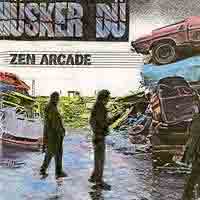 Mit diesem größenwahnsinnigen Doppelalbum mit ca. 25 Songs (!) gelang
dem Punkrock-Trio aus Minneapolis der große Durchbruch. Einen großen
Teil der Faszination dieser Band ging vom Gegensatz der beiden Sänger/Songschreiber
Bob Mould (Gitarre) und Grant Hart (Schlagzeug) aus. Dazwischen
hielt Bassist Greg Norton die ganze Sache zusammen. Während
Meistergitarrist Mould die komplexeren Songs schrieb, war Grant Hart
eher für die "poppige" Seite zuständig.
Mit diesem größenwahnsinnigen Doppelalbum mit ca. 25 Songs (!) gelang
dem Punkrock-Trio aus Minneapolis der große Durchbruch. Einen großen
Teil der Faszination dieser Band ging vom Gegensatz der beiden Sänger/Songschreiber
Bob Mould (Gitarre) und Grant Hart (Schlagzeug) aus. Dazwischen
hielt Bassist Greg Norton die ganze Sache zusammen. Während
Meistergitarrist Mould die komplexeren Songs schrieb, war Grant Hart
eher für die "poppige" Seite zuständig. |
| Lloyd Cole & The Commotions: "Rattlesnakes" (Polydor, Okt. 1984) |
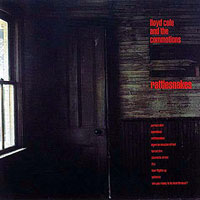 Ein
grandioses Debüt der schottischen Band, dessen Qualität Lloyd
Cole danach mit Band oder Solo nie mehr erreicht hat - obwohl auch spätere
Alben nicht schlecht sind. Mitten im New-Wave voller Drumcomputer und
übelster Digitalkeyboards war diese Band mit ihrem altmodischen
Sound (unverzerrte Gitarren, Schlagzeug, echtes Piano, Hammond-Orgel,
etc.) eine Wohltat für meine Ohren. Und nein: Cole war nicht der
neue Dylan - oder der neue Lou Reed. Ein
grandioses Debüt der schottischen Band, dessen Qualität Lloyd
Cole danach mit Band oder Solo nie mehr erreicht hat - obwohl auch spätere
Alben nicht schlecht sind. Mitten im New-Wave voller Drumcomputer und
übelster Digitalkeyboards war diese Band mit ihrem altmodischen
Sound (unverzerrte Gitarren, Schlagzeug, echtes Piano, Hammond-Orgel,
etc.) eine Wohltat für meine Ohren. Und nein: Cole war nicht der
neue Dylan - oder der neue Lou Reed. |
| Rain Parade: "Explosions In The Glass Palace" (Enigma, Okt. 1984) |
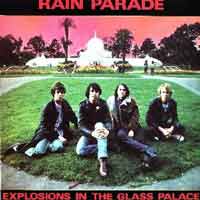 Nach dem Ausstieg von David Roback hatten sein Bruder Steven Roback
und Matt Piucci nur Material für eine EP zusammen. In der
Kürze liegt aber bekanntlich oft die Würze: für mich
ist "Explosions..." das beste Album der Band.
Nach dem Ausstieg von David Roback hatten sein Bruder Steven Roback
und Matt Piucci nur Material für eine EP zusammen. In der
Kürze liegt aber bekanntlich oft die Würze: für mich
ist "Explosions..." das beste Album der Band.

 Mehr ...
Mehr ...
|
Listeners who were enraptured by this band's first effort should enjoy this follow-up, even though principal member David Roback had already quit. Don't know if this is considered an LP or EP, as it clocks in at a mere 20 minutes, but it's still superior to other recycled psychedelia from L.A.'s Paisley Underground. Layered guitars, special effects, droning vocals, catchy hooks � they're all here. The Rain Parade never broke any barriers during their brief existence, but they really captured the spirit of '60s psychedelic rock better than most.
(by Peter Kurtz, All Music Guide)
|
|
| Screaming Blue Messiahs: "Good & Gone" (Big Beat, Okt. 1984) |
 Bill
Carter und Chris Thompson spielten 1980-82 bei Motor
Boys Motor, taten sich nach deren Split mit Drummer Ken Harris
zusammen, um dieses ungewöhnliche Powertrio zu bilden. "Good
& Gone" ist die Debüt EP, ein mittlerer Independent Erfolg,
dem noch drei Alben bei WEA folgten, bevor die Band Ende der 80er dort
wegen mangelnden kommerziellen Erfolges rausflog, um sich kurz danach
aufzulösen. Die übliche Geschichte. Bill
Carter und Chris Thompson spielten 1980-82 bei Motor
Boys Motor, taten sich nach deren Split mit Drummer Ken Harris
zusammen, um dieses ungewöhnliche Powertrio zu bilden. "Good
& Gone" ist die Debüt EP, ein mittlerer Independent Erfolg,
dem noch drei Alben bei WEA folgten, bevor die Band Ende der 80er dort
wegen mangelnden kommerziellen Erfolges rausflog, um sich kurz danach
aufzulösen. Die übliche Geschichte. |
| Talking Heads: "Stop Making Sense" (EMI/Sire, Okt. 1984) |
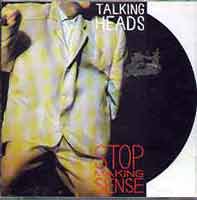 Dies
ist der Soundtrack zum gleichnamigen Konzertfilm von Jonathan Demme.
Für mich einer der besten Konzertfilme überhaupt - obwohl
ich eigentlich kein richtiger Talking Heads-Fan bin. Dies
ist der Soundtrack zum gleichnamigen Konzertfilm von Jonathan Demme.
Für mich einer der besten Konzertfilme überhaupt - obwohl
ich eigentlich kein richtiger Talking Heads-Fan bin. |
| Cocteau Twins: "Treasure" (4AD, Nov. 1984) |
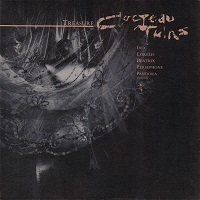

 Mehr ...
Mehr ...
Nachdem sich der Bassist Will Heggie von Liz Fraser (Gesang) und Robin Guthrie (Gitarre, Bass, Schlagzeug) getrennt hatte, veröffentlichten die Cocteau Twins 1983 mit »Head Over Heels« ihr zweites Album. Es blieb das einzige als Duo eingespielte Werk, bei den Aufnahmen für »Treasure« wirkte Simon Raymonde (Bass, Gitarre, Klavier) mit, welcher der 1980 in Grangemouth, Schottland, gegründeten Formation bis zur Auflösung 1998 erhalten blieb.
Zu Raymonde bestanden bereits länger gute Kontakte, der Plattenverkäufer und ehemalige Mitmusiker von Drowning Craze hatte die Cocteau Twins einst an Ivo Watts- Russell vermittelt, den Besitzer des 1980 gegründeten Independent-Labels 4AD. Die 1984 veröffentlichte LP »Treasure« wurde von dem Soundtüftler Guthrie selbst produziert. Sie enthält mit den Stücken »Lorelei«, »Ivo« und »Persephone« drei Klassiker, die in keiner CT-Sammlung fehlen.
»Treasure« bedeutete den endgültigen Durchbruch für die Band. »Pitchfork« nahm die Platte in die »Top 100 Alben der 80er« auf und begründete die Entscheidung mit den Worten: »›Treasure‹ was titled simply enough. An adjective for the endlessly inventive melodic lines you'd find buried in these songs, and a verb for what you'd do with them for years to come.«
|
| Los Lobos: "How Will The Wolf Survive?" (Slash, Nov. 1984) |
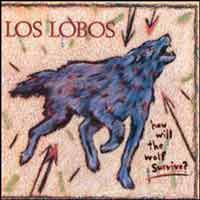

 Mehr ...
Mehr ...
Los Lobos spent years playing parties, wedding receptions, restaurants, bars, and anyplace else where someone might pay them for a gig before landing a deal with Slash Records, and their first full-length album for the label, How Will the Wolf Survive?, is the work of a band that had learned how to play something for everyone while still maintaining their own musical personality in the process. How Will the Wolf Survive? swings back and forth from straight-ahead rock ("Don't Worry Baby") and potent R&B grooves ("I Got Loaded") to country-accented blues ballads ("A Matter of Time") and Mexican traditional numbers ("Serenata Nortena"), with the band's exemplary taste, musical smarts, and road-tested maturity in evidence on every cut. While rarely flashy, even a casual listen offers all the proof you might need that Los Lobos were a band of world-class musicians, with David Hidalgo's guitar work especially impressive throughout. Just as importantly, How Will the Wolf Survive? was the first album where Los Lobos showed how much they had to say as songwriters, especially on "A Matter of Time" and the title cut, two songs that offered a moving and compassionate look at the lives of illegal aliens in America. On ...And a Time to Dance, Los Lobos showed the world that they were a great dance band, but How Will the Wolf Survive? showed they were a great dance band, and a lot more besides.
(by Mark Deming, All Music Guide)
|
| Nanci Griffith: "Once In A Very Blue Moon" (Philo, Dez. 1984) |
|
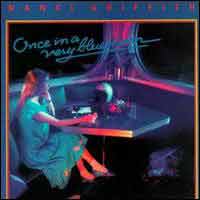 Ein Frühwerk der texanischen Sängerin und Songschreiberin
bei dem kleinen Philo-Label, bevor sie danach bei MCA noch etwas unpassend
zur Countrysängerin aufgebaut werden sollte und schließlich
erfolgreich bei Elektra landete. Neben tollen, guten eigenen Songs
sind es hier aber vor allem die geschmackvollen Coverversionen, die
überzeugen: "Rosehill Fair" (Bill Staines), "Once
In A Very Blue Moon" (Pat Alger) und "If I Were The Woman
You Wanted" (Lyle Lovett). Auch die Mitspieler sind von allerhöchster
Gäste: Saitenzauberer Mark O'Connor, Lyle Lovett
höchstpersönlich, Lee Claytons Gitarrist Phil Donnelly,
Banjo-Hexer Bela Fleck u.a.
Ein Frühwerk der texanischen Sängerin und Songschreiberin
bei dem kleinen Philo-Label, bevor sie danach bei MCA noch etwas unpassend
zur Countrysängerin aufgebaut werden sollte und schließlich
erfolgreich bei Elektra landete. Neben tollen, guten eigenen Songs
sind es hier aber vor allem die geschmackvollen Coverversionen, die
überzeugen: "Rosehill Fair" (Bill Staines), "Once
In A Very Blue Moon" (Pat Alger) und "If I Were The Woman
You Wanted" (Lyle Lovett). Auch die Mitspieler sind von allerhöchster
Gäste: Saitenzauberer Mark O'Connor, Lyle Lovett
höchstpersönlich, Lee Claytons Gitarrist Phil Donnelly,
Banjo-Hexer Bela Fleck u.a.

 Mehr ...
Mehr ...
|
"Taking a big step forward in production quality,
this Jim Rooney-produced album captures Nanci's voice beautifully. Some
of her finest singing is here, accompanied by a large cast of seasoned
supporting musicians. The songs cover a greater variety of styles and
tempos, and include Bill Staines' "Roseville Fair," Lyle Lovett's
"If I Were the Woman You Wanted," and the title song from Pat
Alger. Among Nanci's own numbers are "Time Alone," "Friend
Out in the Madness," and "Daddy Said," each of which combines
lovely melodies and lyrics. "Spin on a Red Brick Floor" is her
tribute to the Anderson Fair music club in Houston. An album this good
comes out once in a VERY blue moon"
|
|
| Any Trouble: "Wrong End Of The Race" (EMI America, 1984) |
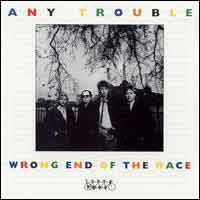 Viertes und letztes Album einer Klasseband, die leider mit ihrer Musik ein paar
Jahre zu spät dran war. In den frühen 80ern wären sie
mit Punk/New Wave sicherlich erfolgreicher gewesen, als mit ihrem klassischen
Gitarrenpop. Das Debüt kam 1980 beim kultigen Stiff-Label
raus, passte eigentlich auch ganz gut zwischen Nick Lowe und
Elvis Costello und brachte einen kleineren Achtungserfolg. Der
Nachfolger "Wheels In Motion" war aber nicht mehr so spannend.
Das dritte, titellose Album bei der US-Filiale von Mutter EMI geriet
leider stark keyboardlastig und schielte wohl auf den New-Wave-Markt
á la Tears For Fears. Das ging natürlich völlig
schief, unter anderem vielleicht, weil Sänger/Songschreiber/Gitarrist/Keyboarder
Clive Gregson mit Hornbrille (OK.: Elvis C. trägt
auch eine!), Halbglatze und Bäuchlein (klarer Punktsieger hier:
Elvis C.) eher nach Lehrer oder Buchhalter aussah. Auf Album #4 wurde
dann von den Pop-Ambitionen her deutlich zurückgerudert. Gregson
konnte der Plattenfirma, zumindest für den heimischen englischen
Markt, sogar ein Doppelalbum herausleiern, auf dem noch mal all das
gezeigt wurde, was in der Band steckt. Hier wurde mit interessanten
Gästen (Richard Thompson, Geoff Muldaur, Billy
Bremner von Rockpile, Gavin & Ian Sutherland, Ian
Matthews) entspannt gerockt und zeitloser Pop zelebriert. Haben
leider nur nicht viele mitbekommen.
Viertes und letztes Album einer Klasseband, die leider mit ihrer Musik ein paar
Jahre zu spät dran war. In den frühen 80ern wären sie
mit Punk/New Wave sicherlich erfolgreicher gewesen, als mit ihrem klassischen
Gitarrenpop. Das Debüt kam 1980 beim kultigen Stiff-Label
raus, passte eigentlich auch ganz gut zwischen Nick Lowe und
Elvis Costello und brachte einen kleineren Achtungserfolg. Der
Nachfolger "Wheels In Motion" war aber nicht mehr so spannend.
Das dritte, titellose Album bei der US-Filiale von Mutter EMI geriet
leider stark keyboardlastig und schielte wohl auf den New-Wave-Markt
á la Tears For Fears. Das ging natürlich völlig
schief, unter anderem vielleicht, weil Sänger/Songschreiber/Gitarrist/Keyboarder
Clive Gregson mit Hornbrille (OK.: Elvis C. trägt
auch eine!), Halbglatze und Bäuchlein (klarer Punktsieger hier:
Elvis C.) eher nach Lehrer oder Buchhalter aussah. Auf Album #4 wurde
dann von den Pop-Ambitionen her deutlich zurückgerudert. Gregson
konnte der Plattenfirma, zumindest für den heimischen englischen
Markt, sogar ein Doppelalbum herausleiern, auf dem noch mal all das
gezeigt wurde, was in der Band steckt. Hier wurde mit interessanten
Gästen (Richard Thompson, Geoff Muldaur, Billy
Bremner von Rockpile, Gavin & Ian Sutherland, Ian
Matthews) entspannt gerockt und zeitloser Pop zelebriert. Haben
leider nur nicht viele mitbekommen. |
| "Rainy Day" (Rough Trade/Pop Llama, 1984) |
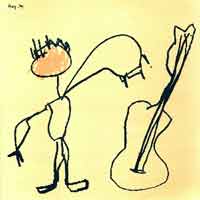 "Rainy Day" war eigentlich keine Band, sondern eine Session-Projekt
der "Stars" des damals in Los Angeles aufblühenden "Paisley-Undergrounds",
initiiert von Ex-Rain Parade
David Roback. Mit dabei waren u. a. Kendra Smith, mit
der er danach Opal gründete,
Dennis Duck und Karl Precoda (Dream
Syndicate), Susanna Hoffs und Vicki Peterson (Bangles),
Matt Piucci, Will Glenn und Steven Roback (Rain
Parade). Die Songs waren zwar "nur" Coverversonen, dafür
aber sehr geschmackvolle: "I'll Keep It With Mine" (von Bob
Dylan für Nico verfasst),
"Flying On The Ground" und "On The Way Home" (Neil
Young/Buffalo Springfield), "I'll Be Your Mirror" (Lou
Reed/Velvet Underground), "Sloop
John B." (Beach Boys/Pet
Sounds), "Rainy Day, Dream Away" (Jimi Hendrix)
und "Holocaust" (Alex Chilton/Big Star) u. a.
"Rainy Day" war eigentlich keine Band, sondern eine Session-Projekt
der "Stars" des damals in Los Angeles aufblühenden "Paisley-Undergrounds",
initiiert von Ex-Rain Parade
David Roback. Mit dabei waren u. a. Kendra Smith, mit
der er danach Opal gründete,
Dennis Duck und Karl Precoda (Dream
Syndicate), Susanna Hoffs und Vicki Peterson (Bangles),
Matt Piucci, Will Glenn und Steven Roback (Rain
Parade). Die Songs waren zwar "nur" Coverversonen, dafür
aber sehr geschmackvolle: "I'll Keep It With Mine" (von Bob
Dylan für Nico verfasst),
"Flying On The Ground" und "On The Way Home" (Neil
Young/Buffalo Springfield), "I'll Be Your Mirror" (Lou
Reed/Velvet Underground), "Sloop
John B." (Beach Boys/Pet
Sounds), "Rainy Day, Dream Away" (Jimi Hendrix)
und "Holocaust" (Alex Chilton/Big Star) u. a.

 Mehr ...
Mehr ...
Rainy Day was an album released in 1984 on the now-defunct indie label Enigma. It consisted of cover songs performed by various musicians from California's so-called "Paisley Underground" scene. This loose collective was assembled by David Roback, who was then a member of Rain Parade and later of Opal and Mazzy Star. Other participants included Roback's Rain Parade mates (brother Stephen Roback, Matthew Piucci, Will Glenn) and members of the then-little-known Bangles (Susanna Hoffs and Vicki Peterson), the Dream Syndicate (Kendra Smith, Dennis Duck, Karl Precoda), and the Three O'Clock (Michael Quercio).
The songs that were chosen indicated the influences that were generally shared by bands from that scene; not only is a Velvet Underground song covered, but also one by Big Star, and two by the Buffalo Springfield which both happen to be Neil Young compositions. Some other selections are old folk songs which are best remembered as Byrds and Beach Boys recordings. Hendrix and the Who also made the list.
Rainy Day has not been commercially available for many years; it seems like every indie label that has distributed the album has gone out of business. But there is always hope that it may resurface.
Rainy Day opens with an utterly likable version of Dylan's "I'll Keep It With Mine", sung by Hoffs. Hoffs brings a similar accessibility to the Velvet Underground's "I'll Be Your Mirror"; the sweetness of her vocals provides a nice contrast to Nico's vocals on the original recordings of both songs. Kendra Smith also does well with her two vocal turns: she lends just the right amount of emotion to the Buffalo Springfield's lovely "Flying on the Ground is Wrong", and her nearly emotionless reading of Big Star's "Holocaust" is appropriately chilling. The respectable cover of the folk classic "John Riley" is clearly based on the Byrds' version; the vocals (by Michael Quercio) and the guitar both echo Roger McGuinn. If you've ever wondered (as I have) what the Buffalo Springfield's "On the Way Home" would have sounded like as a Neil Young solo track, Roback's solo acoustic-strummed rendition is probably a close approximation. Although there are no guitar heroes in this bunch, it is nonetheless cool to hear these musicians apply their own quirky styles to the Who�s �Soon Be Home� and to an eleven-minute rendition of Jimi Hendrix�s jazz fusion jam �Rainy Day, Dream Away�.
It should be noted that less care was taken with the recording of the vocals on this album than with the instrumentation. Roback did not hold himself to high standards in this department, and "Sloop John B." suffers from a particularly underwhelming turn by Quercio. Even this type of casual indie project can be unnecessarily marred by such a flaw. Regardless, Rainy Day succeeds where countless other covers albums have failed. Its participants show genuine love for the material and manage to present it in their own distinctive way. It's a unique collaboration by like-minded musicians from a specific time and place. And it�s a fine record to listen to on a rainy day.
This album is a good companion piece to Under the Covers, Vol. 1, a 2006 collaboration between Hoffs and Matthew Sweet. That CD contained covers of songs by some of the same artists covered on Rainy Day.
(RAREBIRD'S ROCK AND ROLL RARITY REVIEWS)
|
| Snakefinger&'s History Of The Blues: "Live In Bremen" (Rough Trade, 1984) |
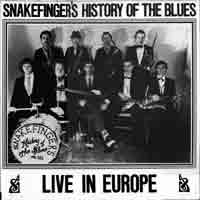 Eine sehr merkwürdige Bluesplatte. Der Engländer Snakefinger (Phil Lithman) machte in den
70ern Pubrock (Chilli Willi & The Red Hot Peppers) und
arbeitet danach mit den Avantgarde-Rockern(?) The Residents zusammen. Dieses Livealbum
(bei Radio Bremen aufgenommen) enthielt traditionelles Bluesmaterial, das völlig
unironisch und absolut groovig präsentiert wurde. Die Frage bleibt:
wie kommt der Mann mitten in den 80ern auf sowas? Vielleicht als intellektuelle
Version der Blues Brothers? Und dann auch noch bei der deutschen Abteilung
des englischen New-Wave-Kultlabels Rough Trade? Fragen über Fragen!
Es gibt übrigenz keine CD und es sind damals angeblich nur 1000
LPs gepresst worden: ein ultra-rares Teil!
Eine sehr merkwürdige Bluesplatte. Der Engländer Snakefinger (Phil Lithman) machte in den
70ern Pubrock (Chilli Willi & The Red Hot Peppers) und
arbeitet danach mit den Avantgarde-Rockern(?) The Residents zusammen. Dieses Livealbum
(bei Radio Bremen aufgenommen) enthielt traditionelles Bluesmaterial, das völlig
unironisch und absolut groovig präsentiert wurde. Die Frage bleibt:
wie kommt der Mann mitten in den 80ern auf sowas? Vielleicht als intellektuelle
Version der Blues Brothers? Und dann auch noch bei der deutschen Abteilung
des englischen New-Wave-Kultlabels Rough Trade? Fragen über Fragen!
Es gibt übrigenz keine CD und es sind damals angeblich nur 1000
LPs gepresst worden: ein ultra-rares Teil! |
| The Jazz Butcher: "A Scandal In Bohemia" (Glass, 1984) |
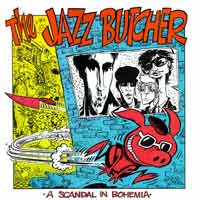 The Jazzbutcher ist das irreführende Pseudonym des
Engländers Pat Fish und gleichzeitig der Name seiner Band.
Die Musik ist weder mörderisch-blutrünstig noch jazzig-intellektuell
- eher ein wunderbar unspektakulärer Gitarrensound mit viel britischem
Humor und Coolness.
The Jazzbutcher ist das irreführende Pseudonym des
Engländers Pat Fish und gleichzeitig der Name seiner Band.
Die Musik ist weder mörderisch-blutrünstig noch jazzig-intellektuell
- eher ein wunderbar unspektakulärer Gitarrensound mit viel britischem
Humor und Coolness.

 Mehr ...
Mehr ...
Recording with a stable backup band, the Jazz Butcher here puts together a top-shelf diamond of a record that is filled with excellent, memorable songs. Diverse styles are deftly referenced here and the lyrics are focused, wry, and often killer clever. The sound quality is a big improvement over that of his prior release, In Bath of Bacon. The drivingly tuneful "Southern Mark Smith" and "Girlfriend" are in a ringing folk-pop style. "I Need Meat" is a jumpy, neo-rockabilly number. "Marnie" deftly mixes funk and ethnic influences. "My Desert" is essentially a sea chantey or campfire singalong with ironically downbeat lyrics. "Caroline Wheeler's Birthday Present" is a fuzzed-out hard rock parody with irreverently Dylan-esque "I Shall Be Free" style lyrics. "Just like Betty Page" is an uptempo, acoustic guitar based, top-tapping delight. And the wonderfully inventive "Real Men" utilizes a bizarre accompaniment of thudding drums, rumbling bass, and sparkling glockenspiel surrounding hilarious lyrics that attack macho attitudes. Don't pass up this album if you can find it.
(by David Cleary, All Music Guide)
|
 weitere Highlights ...
weitere Highlights ...  Das
Debutalbum der Band um den Sänger/Texter Morrissey
und den Gitarristen/Komponisten Johnny Marr. Als es damals erschien,
reagierte – schon im Vorfeld – die englische Presse wieder
einmal völlig hysterisch und jubelte die Band in die Charts. Ausnahmsweise
mal zu Recht. Die Smiths haben Britanniens Musikwelt nachhaltig beeinflusst.
Vor den Smiths war Morrissey schon als Bucherschreiber aktiv („James
Dean Isn’t Dead“) und leitete die UK-Filiale des New York
Dolls Fan Clubs.
Das
Debutalbum der Band um den Sänger/Texter Morrissey
und den Gitarristen/Komponisten Johnny Marr. Als es damals erschien,
reagierte – schon im Vorfeld – die englische Presse wieder
einmal völlig hysterisch und jubelte die Band in die Charts. Ausnahmsweise
mal zu Recht. Die Smiths haben Britanniens Musikwelt nachhaltig beeinflusst.
Vor den Smiths war Morrissey schon als Bucherschreiber aktiv („James
Dean Isn’t Dead“) und leitete die UK-Filiale des New York
Dolls Fan Clubs. Ich
bin zwar kein richtiger Fan des britischen Genies und Misanthropen,
aber ich finde, dass dies ein wunderbares Album ist - nicht zuletzt
wegen des coolen, an eine alte Blue Note-Platte von Sonny
Rollins angelehnten Covers.
Ich
bin zwar kein richtiger Fan des britischen Genies und Misanthropen,
aber ich finde, dass dies ein wunderbares Album ist - nicht zuletzt
wegen des coolen, an eine alte Blue Note-Platte von Sonny
Rollins angelehnten Covers.  Nach
sechs Jahren Pause mal wieder ein Album der Sängerin, Pianistin
und Songschreiberin, die ihre größten Erfolge bereits als
Teenager Ende der 60er feierte, als teilweise mehrere ihrer Songs gleichzeitig
in den US-Charts waren - leider aber immer in den Versionen anderer
Kunstler (z.B. "Wedding Bell Blues" von den 5th Dimensions,
"Eli's Coming" von Three Dog Night, "Stoney End"
von Barbara Streisand, "And When I Die" von Blood,
Sweat & Tears), dabei waren alle ihre eigenen Alben, so auch
dieses von Todd Rundgren produzierte, immer von beeindruckender Qualität.
Kleines Kuriosum am Rande: ihren einzigen eigenen Hit hatte sie mit
einer Coverversion: "Up On The Roof" von Carole King.
Nach
sechs Jahren Pause mal wieder ein Album der Sängerin, Pianistin
und Songschreiberin, die ihre größten Erfolge bereits als
Teenager Ende der 60er feierte, als teilweise mehrere ihrer Songs gleichzeitig
in den US-Charts waren - leider aber immer in den Versionen anderer
Kunstler (z.B. "Wedding Bell Blues" von den 5th Dimensions,
"Eli's Coming" von Three Dog Night, "Stoney End"
von Barbara Streisand, "And When I Die" von Blood,
Sweat & Tears), dabei waren alle ihre eigenen Alben, so auch
dieses von Todd Rundgren produzierte, immer von beeindruckender Qualität.
Kleines Kuriosum am Rande: ihren einzigen eigenen Hit hatte sie mit
einer Coverversion: "Up On The Roof" von Carole King. Mehr ...
Mehr ...

 Mehr ...
Mehr ...
 Letztes
Album der Band um den wilden Mann Jeffrey Lee Pierce vor deren
Auflösung. Im nächsten Jahr folgt dann das sehr schöne
Soloalbum "Wildweed",
das naturlich trotzdem wie eine richtige Gun Club-Platte
klingt. Mit dem 1987er Album "Mother
Juno" besinnt sich der Mann wieder und nennt das ganze wieder
korrekt.
Letztes
Album der Band um den wilden Mann Jeffrey Lee Pierce vor deren
Auflösung. Im nächsten Jahr folgt dann das sehr schöne
Soloalbum "Wildweed",
das naturlich trotzdem wie eine richtige Gun Club-Platte
klingt. Mit dem 1987er Album "Mother
Juno" besinnt sich der Mann wieder und nennt das ganze wieder
korrekt. Nick
Cave mit seiner Birthday Party und die Go-Betweens
waren nicht die einzigen Australier, die sich damals in London herumgetrieben
haben. Sänger Dave Graney und Trommlerin und Ehefrau (oder
Freundin?) Clare Moore spielten mit ihren Mitstreitern einen
Nick Cave nicht ganz unähnlichen punkigen Bluesrock, auch
wenn Graney den Vergleich wohl nicht so gerne hörte. Ende der 80er
gingen Graney und Moore zuruck nach Australien und machten zuerst
mit den White Buffalos und den Coral
Snakes sowas wie Countryrock (sie coverten auf "My
Life On The Plains" ganz wunderbar Gram Parsons und
Gene Clark) und haben im neuen Jahrtausend als The Dave Grane
Show auch den Computer entdeckt, was mir persönlich dann nicht
mehr ganz so gut gefällt. Was bleibt unterm Strich: ein begnadeter
Sänger, der sich durchaus mit Van Morrison messen kann,
in seiner wilden Fruhphase.
Nick
Cave mit seiner Birthday Party und die Go-Betweens
waren nicht die einzigen Australier, die sich damals in London herumgetrieben
haben. Sänger Dave Graney und Trommlerin und Ehefrau (oder
Freundin?) Clare Moore spielten mit ihren Mitstreitern einen
Nick Cave nicht ganz unähnlichen punkigen Bluesrock, auch
wenn Graney den Vergleich wohl nicht so gerne hörte. Ende der 80er
gingen Graney und Moore zuruck nach Australien und machten zuerst
mit den White Buffalos und den Coral
Snakes sowas wie Countryrock (sie coverten auf "My
Life On The Plains" ganz wunderbar Gram Parsons und
Gene Clark) und haben im neuen Jahrtausend als The Dave Grane
Show auch den Computer entdeckt, was mir persönlich dann nicht
mehr ganz so gut gefällt. Was bleibt unterm Strich: ein begnadeter
Sänger, der sich durchaus mit Van Morrison messen kann,
in seiner wilden Fruhphase. Das
Solodebut des ehemaligen Japan-Sängers, begleitet von seinem
Bruder Steve Jansen am Schlagzeug und Can-Bassist Holger Czukay
und unterstutzt von zahlreichen Gästen (u.a. Basslegende
Danny Thompson, dem japanischen Klangzauberer Ryuichi Sakamoto
und gleich drei außergewöhnlichen Jazztrompetern: Kenny Wheeler,
Jon Hassell und Mark Isham!) ist klanglich und musikalisch
ein Meisterwerk. Eine meiner ersten und liebsten CDs.
Das
Solodebut des ehemaligen Japan-Sängers, begleitet von seinem
Bruder Steve Jansen am Schlagzeug und Can-Bassist Holger Czukay
und unterstutzt von zahlreichen Gästen (u.a. Basslegende
Danny Thompson, dem japanischen Klangzauberer Ryuichi Sakamoto
und gleich drei außergewöhnlichen Jazztrompetern: Kenny Wheeler,
Jon Hassell und Mark Isham!) ist klanglich und musikalisch
ein Meisterwerk. Eine meiner ersten und liebsten CDs. Mehr ...
Mehr ...
 Das
erste Album der Band bei einer großen Firma - und trotzdem (?) klasse.
Das war damals auch der (Wieder-)Einstieg fur mich nach einer langen
und wichtigen Bluesphase in die Welt des Gitarrenrocks.
Danke, Steve Wynn.
Das
erste Album der Band bei einer großen Firma - und trotzdem (?) klasse.
Das war damals auch der (Wieder-)Einstieg fur mich nach einer langen
und wichtigen Bluesphase in die Welt des Gitarrenrocks.
Danke, Steve Wynn.
 Mehr ...
Mehr ...
 Debutalbum
und direkter Chartserfolg eines meiner Lieblingsduos aus England (naturlich
nicht die blöden Eurythmics!). Sängerin Tracey Thorn
hat eine wunderbare Stimme (die mir zum ersten Mal auf den Alben "Liberty
Belle..." der Go-Betweens und "Mainstream"
von Lloyd Cole aufgefallen war. Ihr Partner ist der Gitarrist
und Gelegenheitskeyboarder und -sänger Ben Watt. Beide schreiben
getrennt und auch gelegentlich zusammen ziemlich gute Songs. Unterstützt
werden sie bei der Umsetzung von einer vorzüglichen Band: Simon
Booth (Gitarre, von Working Week), Bosco De Oliveira
(Perkussion), Charles Hayward (Schlagzeug), Chucho Merchan
(Kontrabass), Pete King (Altsax), Nigel Nash (Tenorsax)
und Dick Pearce (Trompete).
Debutalbum
und direkter Chartserfolg eines meiner Lieblingsduos aus England (naturlich
nicht die blöden Eurythmics!). Sängerin Tracey Thorn
hat eine wunderbare Stimme (die mir zum ersten Mal auf den Alben "Liberty
Belle..." der Go-Betweens und "Mainstream"
von Lloyd Cole aufgefallen war. Ihr Partner ist der Gitarrist
und Gelegenheitskeyboarder und -sänger Ben Watt. Beide schreiben
getrennt und auch gelegentlich zusammen ziemlich gute Songs. Unterstützt
werden sie bei der Umsetzung von einer vorzüglichen Band: Simon
Booth (Gitarre, von Working Week), Bosco De Oliveira
(Perkussion), Charles Hayward (Schlagzeug), Chucho Merchan
(Kontrabass), Pete King (Altsax), Nigel Nash (Tenorsax)
und Dick Pearce (Trompete). Sein
Meisterwerk darf natürlich in dieser Liste nicht fehlen!
Sein
Meisterwerk darf natürlich in dieser Liste nicht fehlen!
 Mehr ...
Mehr ...
 Das legendäre Solo-Akustikalbum des ehemaligen Chefs der Soft
Boys und zukünftigen Chefs der Egyptians.
Dazu passt dann noch die DVD zum 25jährigen Veröffentlichungsjubiläum,
auf der Hitchcock das komplette Album
live auf die Bühne bringt.
Das legendäre Solo-Akustikalbum des ehemaligen Chefs der Soft
Boys und zukünftigen Chefs der Egyptians.
Dazu passt dann noch die DVD zum 25jährigen Veröffentlichungsjubiläum,
auf der Hitchcock das komplette Album
live auf die Bühne bringt.  Mehr ...
Mehr ...
 Mit diesem größenwahnsinnigen Doppelalbum mit ca. 25 Songs (!) gelang
dem Punkrock-Trio aus Minneapolis der große Durchbruch. Einen großen
Teil der Faszination dieser Band ging vom Gegensatz der beiden Sänger/Songschreiber
Bob Mould (Gitarre) und Grant Hart (Schlagzeug) aus. Dazwischen
hielt Bassist Greg Norton die ganze Sache zusammen. Während
Meistergitarrist Mould die komplexeren Songs schrieb, war Grant Hart
eher für die "poppige" Seite zuständig.
Mit diesem größenwahnsinnigen Doppelalbum mit ca. 25 Songs (!) gelang
dem Punkrock-Trio aus Minneapolis der große Durchbruch. Einen großen
Teil der Faszination dieser Band ging vom Gegensatz der beiden Sänger/Songschreiber
Bob Mould (Gitarre) und Grant Hart (Schlagzeug) aus. Dazwischen
hielt Bassist Greg Norton die ganze Sache zusammen. Während
Meistergitarrist Mould die komplexeren Songs schrieb, war Grant Hart
eher für die "poppige" Seite zuständig. Ein
grandioses Debüt der schottischen Band, dessen Qualität Lloyd
Cole danach mit Band oder Solo nie mehr erreicht hat - obwohl auch spätere
Alben nicht schlecht sind. Mitten im New-Wave voller Drumcomputer und
übelster Digitalkeyboards war diese Band mit ihrem altmodischen
Sound (unverzerrte Gitarren, Schlagzeug, echtes Piano, Hammond-Orgel,
etc.) eine Wohltat für meine Ohren. Und nein: Cole war nicht der
neue Dylan - oder der neue Lou Reed.
Ein
grandioses Debüt der schottischen Band, dessen Qualität Lloyd
Cole danach mit Band oder Solo nie mehr erreicht hat - obwohl auch spätere
Alben nicht schlecht sind. Mitten im New-Wave voller Drumcomputer und
übelster Digitalkeyboards war diese Band mit ihrem altmodischen
Sound (unverzerrte Gitarren, Schlagzeug, echtes Piano, Hammond-Orgel,
etc.) eine Wohltat für meine Ohren. Und nein: Cole war nicht der
neue Dylan - oder der neue Lou Reed.  Nach dem Ausstieg von David Roback hatten sein Bruder Steven Roback
und Matt Piucci nur Material für eine EP zusammen. In der
Kürze liegt aber bekanntlich oft die Würze: für mich
ist "Explosions..." das beste Album der Band.
Nach dem Ausstieg von David Roback hatten sein Bruder Steven Roback
und Matt Piucci nur Material für eine EP zusammen. In der
Kürze liegt aber bekanntlich oft die Würze: für mich
ist "Explosions..." das beste Album der Band.
 Mehr ...
Mehr ...
 Bill
Carter und Chris Thompson spielten 1980-82 bei Motor
Boys Motor, taten sich nach deren Split mit Drummer Ken Harris
zusammen, um dieses ungewöhnliche Powertrio zu bilden. "Good
& Gone" ist die Debüt EP, ein mittlerer Independent Erfolg,
dem noch drei Alben bei WEA folgten, bevor die Band Ende der 80er dort
wegen mangelnden kommerziellen Erfolges rausflog, um sich kurz danach
aufzulösen. Die übliche Geschichte.
Bill
Carter und Chris Thompson spielten 1980-82 bei Motor
Boys Motor, taten sich nach deren Split mit Drummer Ken Harris
zusammen, um dieses ungewöhnliche Powertrio zu bilden. "Good
& Gone" ist die Debüt EP, ein mittlerer Independent Erfolg,
dem noch drei Alben bei WEA folgten, bevor die Band Ende der 80er dort
wegen mangelnden kommerziellen Erfolges rausflog, um sich kurz danach
aufzulösen. Die übliche Geschichte. Dies
ist der Soundtrack zum gleichnamigen Konzertfilm von Jonathan Demme.
Für mich einer der besten Konzertfilme überhaupt - obwohl
ich eigentlich kein richtiger Talking Heads-Fan bin.
Dies
ist der Soundtrack zum gleichnamigen Konzertfilm von Jonathan Demme.
Für mich einer der besten Konzertfilme überhaupt - obwohl
ich eigentlich kein richtiger Talking Heads-Fan bin.
 Mehr ...
Mehr ...

 Mehr ...
Mehr ...
 Mehr ...
Mehr ...
 Viertes und letztes Album einer Klasseband, die leider mit ihrer Musik ein paar
Jahre zu spät dran war. In den frühen 80ern wären sie
mit Punk/New Wave sicherlich erfolgreicher gewesen, als mit ihrem klassischen
Gitarrenpop. Das Debüt kam 1980 beim kultigen Stiff-Label
raus, passte eigentlich auch ganz gut zwischen Nick Lowe und
Elvis Costello und brachte einen kleineren Achtungserfolg. Der
Nachfolger "Wheels In Motion" war aber nicht mehr so spannend.
Das dritte, titellose Album bei der US-Filiale von Mutter EMI geriet
leider stark keyboardlastig und schielte wohl auf den New-Wave-Markt
á la Tears For Fears. Das ging natürlich völlig
schief, unter anderem vielleicht, weil Sänger/Songschreiber/Gitarrist/Keyboarder
Clive Gregson mit Hornbrille (OK.: Elvis C. trägt
auch eine!), Halbglatze und Bäuchlein (klarer Punktsieger hier:
Elvis C.) eher nach Lehrer oder Buchhalter aussah. Auf Album #4 wurde
dann von den Pop-Ambitionen her deutlich zurückgerudert. Gregson
konnte der Plattenfirma, zumindest für den heimischen englischen
Markt, sogar ein Doppelalbum herausleiern, auf dem noch mal all das
gezeigt wurde, was in der Band steckt. Hier wurde mit interessanten
Gästen (Richard Thompson, Geoff Muldaur, Billy
Bremner von Rockpile, Gavin & Ian Sutherland, Ian
Matthews) entspannt gerockt und zeitloser Pop zelebriert. Haben
leider nur nicht viele mitbekommen.
Viertes und letztes Album einer Klasseband, die leider mit ihrer Musik ein paar
Jahre zu spät dran war. In den frühen 80ern wären sie
mit Punk/New Wave sicherlich erfolgreicher gewesen, als mit ihrem klassischen
Gitarrenpop. Das Debüt kam 1980 beim kultigen Stiff-Label
raus, passte eigentlich auch ganz gut zwischen Nick Lowe und
Elvis Costello und brachte einen kleineren Achtungserfolg. Der
Nachfolger "Wheels In Motion" war aber nicht mehr so spannend.
Das dritte, titellose Album bei der US-Filiale von Mutter EMI geriet
leider stark keyboardlastig und schielte wohl auf den New-Wave-Markt
á la Tears For Fears. Das ging natürlich völlig
schief, unter anderem vielleicht, weil Sänger/Songschreiber/Gitarrist/Keyboarder
Clive Gregson mit Hornbrille (OK.: Elvis C. trägt
auch eine!), Halbglatze und Bäuchlein (klarer Punktsieger hier:
Elvis C.) eher nach Lehrer oder Buchhalter aussah. Auf Album #4 wurde
dann von den Pop-Ambitionen her deutlich zurückgerudert. Gregson
konnte der Plattenfirma, zumindest für den heimischen englischen
Markt, sogar ein Doppelalbum herausleiern, auf dem noch mal all das
gezeigt wurde, was in der Band steckt. Hier wurde mit interessanten
Gästen (Richard Thompson, Geoff Muldaur, Billy
Bremner von Rockpile, Gavin & Ian Sutherland, Ian
Matthews) entspannt gerockt und zeitloser Pop zelebriert. Haben
leider nur nicht viele mitbekommen. "Rainy Day" war eigentlich keine Band, sondern eine Session-Projekt
der "Stars" des damals in Los Angeles aufblühenden "Paisley-Undergrounds",
initiiert von Ex-Rain Parade
David Roback. Mit dabei waren u. a. Kendra Smith, mit
der er danach Opal gründete,
Dennis Duck und Karl Precoda (Dream
Syndicate), Susanna Hoffs und Vicki Peterson (Bangles),
Matt Piucci, Will Glenn und Steven Roback (Rain
Parade). Die Songs waren zwar "nur" Coverversonen, dafür
aber sehr geschmackvolle: "I'll Keep It With Mine" (von Bob
Dylan für Nico verfasst),
"Flying On The Ground" und "On The Way Home" (Neil
Young/Buffalo Springfield), "I'll Be Your Mirror" (Lou
Reed/Velvet Underground), "Sloop
John B." (Beach Boys/Pet
Sounds), "Rainy Day, Dream Away" (Jimi Hendrix)
und "Holocaust" (Alex Chilton/Big Star) u. a.
"Rainy Day" war eigentlich keine Band, sondern eine Session-Projekt
der "Stars" des damals in Los Angeles aufblühenden "Paisley-Undergrounds",
initiiert von Ex-Rain Parade
David Roback. Mit dabei waren u. a. Kendra Smith, mit
der er danach Opal gründete,
Dennis Duck und Karl Precoda (Dream
Syndicate), Susanna Hoffs und Vicki Peterson (Bangles),
Matt Piucci, Will Glenn und Steven Roback (Rain
Parade). Die Songs waren zwar "nur" Coverversonen, dafür
aber sehr geschmackvolle: "I'll Keep It With Mine" (von Bob
Dylan für Nico verfasst),
"Flying On The Ground" und "On The Way Home" (Neil
Young/Buffalo Springfield), "I'll Be Your Mirror" (Lou
Reed/Velvet Underground), "Sloop
John B." (Beach Boys/Pet
Sounds), "Rainy Day, Dream Away" (Jimi Hendrix)
und "Holocaust" (Alex Chilton/Big Star) u. a.
 Mehr ...
Mehr ...
 Eine sehr merkwürdige Bluesplatte. Der Engländer Snakefinger (Phil Lithman) machte in den
70ern Pubrock (Chilli Willi & The Red Hot Peppers) und
arbeitet danach mit den Avantgarde-Rockern(?) The Residents zusammen. Dieses Livealbum
(bei Radio Bremen aufgenommen) enthielt traditionelles Bluesmaterial, das völlig
unironisch und absolut groovig präsentiert wurde. Die Frage bleibt:
wie kommt der Mann mitten in den 80ern auf sowas? Vielleicht als intellektuelle
Version der Blues Brothers? Und dann auch noch bei der deutschen Abteilung
des englischen New-Wave-Kultlabels Rough Trade? Fragen über Fragen!
Es gibt übrigenz keine CD und es sind damals angeblich nur 1000
LPs gepresst worden: ein ultra-rares Teil!
Eine sehr merkwürdige Bluesplatte. Der Engländer Snakefinger (Phil Lithman) machte in den
70ern Pubrock (Chilli Willi & The Red Hot Peppers) und
arbeitet danach mit den Avantgarde-Rockern(?) The Residents zusammen. Dieses Livealbum
(bei Radio Bremen aufgenommen) enthielt traditionelles Bluesmaterial, das völlig
unironisch und absolut groovig präsentiert wurde. Die Frage bleibt:
wie kommt der Mann mitten in den 80ern auf sowas? Vielleicht als intellektuelle
Version der Blues Brothers? Und dann auch noch bei der deutschen Abteilung
des englischen New-Wave-Kultlabels Rough Trade? Fragen über Fragen!
Es gibt übrigenz keine CD und es sind damals angeblich nur 1000
LPs gepresst worden: ein ultra-rares Teil! The Jazzbutcher ist das irreführende Pseudonym des
Engländers Pat Fish und gleichzeitig der Name seiner Band.
Die Musik ist weder mörderisch-blutrünstig noch jazzig-intellektuell
- eher ein wunderbar unspektakulärer Gitarrensound mit viel britischem
Humor und Coolness.
The Jazzbutcher ist das irreführende Pseudonym des
Engländers Pat Fish und gleichzeitig der Name seiner Band.
Die Musik ist weder mörderisch-blutrünstig noch jazzig-intellektuell
- eher ein wunderbar unspektakulärer Gitarrensound mit viel britischem
Humor und Coolness.
 Mehr ...
Mehr ...
 Das Album des Jahres
Das Album des Jahres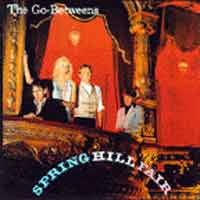 Der
Ausflug der Australier zu einem Major-Label war kunstlerisch gelungen
(finde ich zumindest!), aber kommerziell ein Desaster. Danach ging es
wieder zum Indie Beggars Banquet, wo etwas kleinere
Brötchen gebacken werden (die aber auch satt machen). Fur
Hardcore-Fans sicherlich nicht das beste Album der Band (igitt: große
Plattenfirma! Damals waren Madonna und die Talking
Heads bei Sire!). Mir gefällt es aber u. a. deshalb so
gut, weil die genialen Songs von Forster/McLennan endlich mal mit gutem
Sound aufgenommen wurden, bei Jacques Loussier ("Play
Bach...") in Frankreich, und mit Robert Vickers
endlich ein hauptamtlicher Bassist dabei war, damit sich Grant McLennan
auf die Gitarre konzentrieren konnte. Geniale Songs gibt es außerdem
hier zuhauf: "Bachelor Kisses", "Man 'O Sand To Girl
O' Sea", "Part Company" etc.
Der
Ausflug der Australier zu einem Major-Label war kunstlerisch gelungen
(finde ich zumindest!), aber kommerziell ein Desaster. Danach ging es
wieder zum Indie Beggars Banquet, wo etwas kleinere
Brötchen gebacken werden (die aber auch satt machen). Fur
Hardcore-Fans sicherlich nicht das beste Album der Band (igitt: große
Plattenfirma! Damals waren Madonna und die Talking
Heads bei Sire!). Mir gefällt es aber u. a. deshalb so
gut, weil die genialen Songs von Forster/McLennan endlich mal mit gutem
Sound aufgenommen wurden, bei Jacques Loussier ("Play
Bach...") in Frankreich, und mit Robert Vickers
endlich ein hauptamtlicher Bassist dabei war, damit sich Grant McLennan
auf die Gitarre konzentrieren konnte. Geniale Songs gibt es außerdem
hier zuhauf: "Bachelor Kisses", "Man 'O Sand To Girl
O' Sea", "Part Company" etc.

 Eine sehr merkwurdige Platte - aber irgendwie spurt man
die Größe, die darin steckt. Kennt Ihr das auch: Ihr glaubt
ein Meisterwerk zu hören - und wisst gleichzeitig, dass Ihr als
Hörer dafur eigentlich noch nicht reif seid. Nun ja ...
Eine sehr merkwurdige Platte - aber irgendwie spurt man
die Größe, die darin steckt. Kennt Ihr das auch: Ihr glaubt
ein Meisterwerk zu hören - und wisst gleichzeitig, dass Ihr als
Hörer dafur eigentlich noch nicht reif seid. Nun ja ... Ganz klar: Nick Lowe, Ex-Sänger und Bassist bei Pubrock-Legende
Ganz klar: Nick Lowe, Ex-Sänger und Bassist bei Pubrock-Legende
 Ein Frühwerk der texanischen Sängerin und Songschreiberin
bei dem kleinen Philo-Label, bevor sie danach bei MCA noch etwas unpassend
zur Countrysängerin aufgebaut werden sollte und schließlich
erfolgreich bei Elektra landete. Neben tollen, guten eigenen Songs
sind es hier aber vor allem die geschmackvollen Coverversionen, die
überzeugen: "Rosehill Fair" (Bill Staines), "Once
In A Very Blue Moon" (Pat Alger) und "If I Were The Woman
You Wanted" (Lyle Lovett). Auch die Mitspieler sind von allerhöchster
Gäste: Saitenzauberer Mark O'Connor, Lyle Lovett
höchstpersönlich, Lee Claytons Gitarrist Phil Donnelly,
Banjo-Hexer Bela Fleck u.a.
Ein Frühwerk der texanischen Sängerin und Songschreiberin
bei dem kleinen Philo-Label, bevor sie danach bei MCA noch etwas unpassend
zur Countrysängerin aufgebaut werden sollte und schließlich
erfolgreich bei Elektra landete. Neben tollen, guten eigenen Songs
sind es hier aber vor allem die geschmackvollen Coverversionen, die
überzeugen: "Rosehill Fair" (Bill Staines), "Once
In A Very Blue Moon" (Pat Alger) und "If I Were The Woman
You Wanted" (Lyle Lovett). Auch die Mitspieler sind von allerhöchster
Gäste: Saitenzauberer Mark O'Connor, Lyle Lovett
höchstpersönlich, Lee Claytons Gitarrist Phil Donnelly,
Banjo-Hexer Bela Fleck u.a.